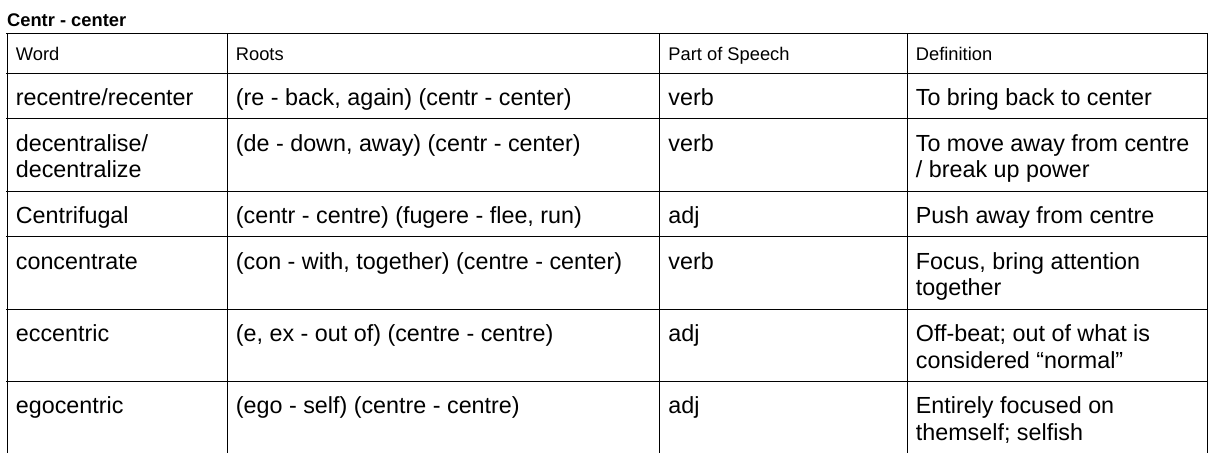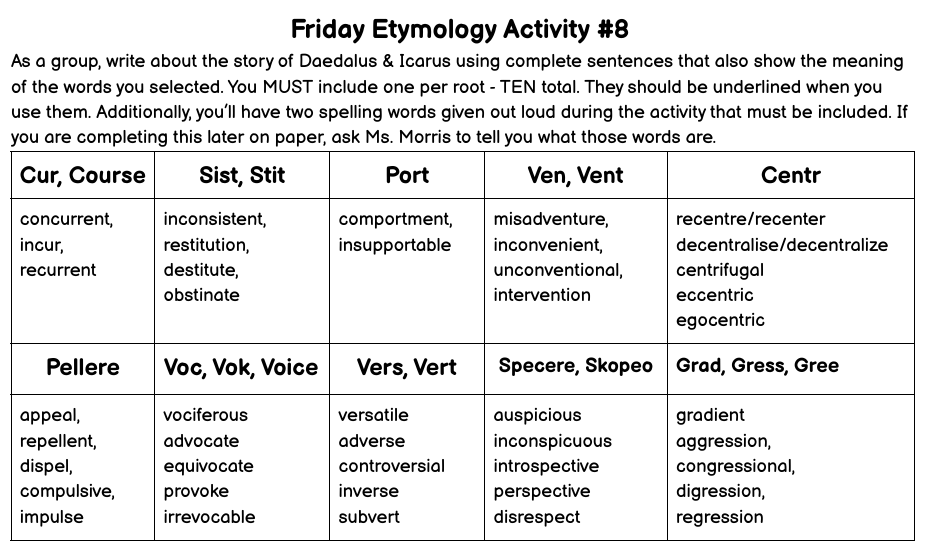I've always taught etymology, usually using English From the Roots Up, which I stole from my mom. She had it as a homeschooling resource for me when I was in elementary school, but it's a really sensible program. The only thing I didn't like was that the words weren't always high-use or high-impact. Knowing tele- and skopeo- are great, but I wanted a better way of helping students break down important words they're likely to see.
With the addition of the vertical surfaces, I made a change in the sequencing of instruction, and changed up the roots I chose to focus on.
We start at the common whiteboard, and I show them the root with its definition. I ask them for words they know that come from the root and take two quickly. Then I send them to their boards to brainstorm all the words they can. I used to do this whole-class, with volunteers suggesting words and me writing them on the board as we went. They would do the "write what I say" version of notes, then study for a traditional test.
Now, I give them a few minutes, and then call them back to the common whiteboard (in my room, it's called the "Jack Whiteboard" because that's the card assigned to it). I usually call out the boards with the best lists, as well as the boards that found a word I've chosen to focus on. I usually pick a range of words (3-6) that are common enough that I can use them in class, but also are words that I think they may encounter but not fully understand.
At the beginning of the year, we talked a lot about how words are put together, and then just went over definitions and what each root meant, focusing particularly on the high-impact prefixes. Then I started talking about what the suffixes told us (usually part of speech) to coincide with doing the first 8 pArts assignment. After they were pretty confident with the four parts of speech we started with (noun, adj, verb, adv), I would include this information in the instruction.
Importantly, I do this instruction fairly briskly while we're standing at the boards. It's important that they are paying attention instead of just writing notes. I also want them to say the definitions of each root part as I list it. So it's something like this:
Okay, so for concentrate, you know the prefix, right? Con means....(pause)...(if no one responds)...like "community"? Then centr means...?
Very much a dialogue, but for the kids who are willing to play along and say the definitions, they've already started memorising them without putting too much effort into it.
When we've gone over all the words, they go back to their notes and try to write it all from memory. They look up at the board when they can't remember.
Here's what the notes include:
I choose what roots to do each week by looking at the texts we're studying soon and making sure I include at least a few words that are relevant. We're doing Daedalus and Icarus right now, so "egocentric" was relevant, and eccentric and egocentric appear in Poe texts we're tackling next week.
This week, I also started introducing a spelling rule on the day between Etymology days (Monday and Wednesday). I'm using Uncovering the Logic of English and introducing her spelling rules each week. This week was the first one: C always says /s/ when followed by e, i, or y, and otherwise says /k/.
I chose words this week that illustrate that rule as well (concentrate and eccentric demonstrate both sounds of C in one word).
To introduce the spelling rule, I asked students to brainstorm on their boards a list of words that have C somewhere in them. I asked that they included words with C in the middle, in the beginning, and in the end. After a few minutes, I asked them to make some generalisations about the sound C makes in those words.
A few students actually articulated the rule correctly BEFORE I introduced it. But the real lightbulb moment was when I showed them why "panic" becomes "panicking" - it HAS to, to maintain the rule. It would be the /s/ sound without the k. As the book promises, when you know the rules, English doesn't seem as illogical and capricious.
I asked students this week to include two words we didn't explicitly go over during Spelling Rule #1 in their end-of-week Etymology paragraphs. This week, it was panicked and accidental. I said those out loud rather than including them in the instructions, obviously.
The weekly assignment asks them to write about whatever text we're studying that week, so it also adds a layer of check for understanding to make sure they got it. I could definitely tell the groups that understood the story and which struggled to remember the details or hadn't done a good job paying attention and taking notes in class.
Here's what it looked like:
The final step is that I grade the paragraphs in front of them using a rubric. The four categories are: 1) complete sentences, 2) written as a paragraph/complete story, 3) words used to show context, and 4) words used correctly. I use advanced/intermediate/basic/no evidence as my headings. Here's a range of graded paragraph:
And they've using the words more frequently in class in other contexts as well. That's what I really wanted - instruction that is durable and helps them make the world around them more vibrant and understandable.




 RSS Feed
RSS Feed
